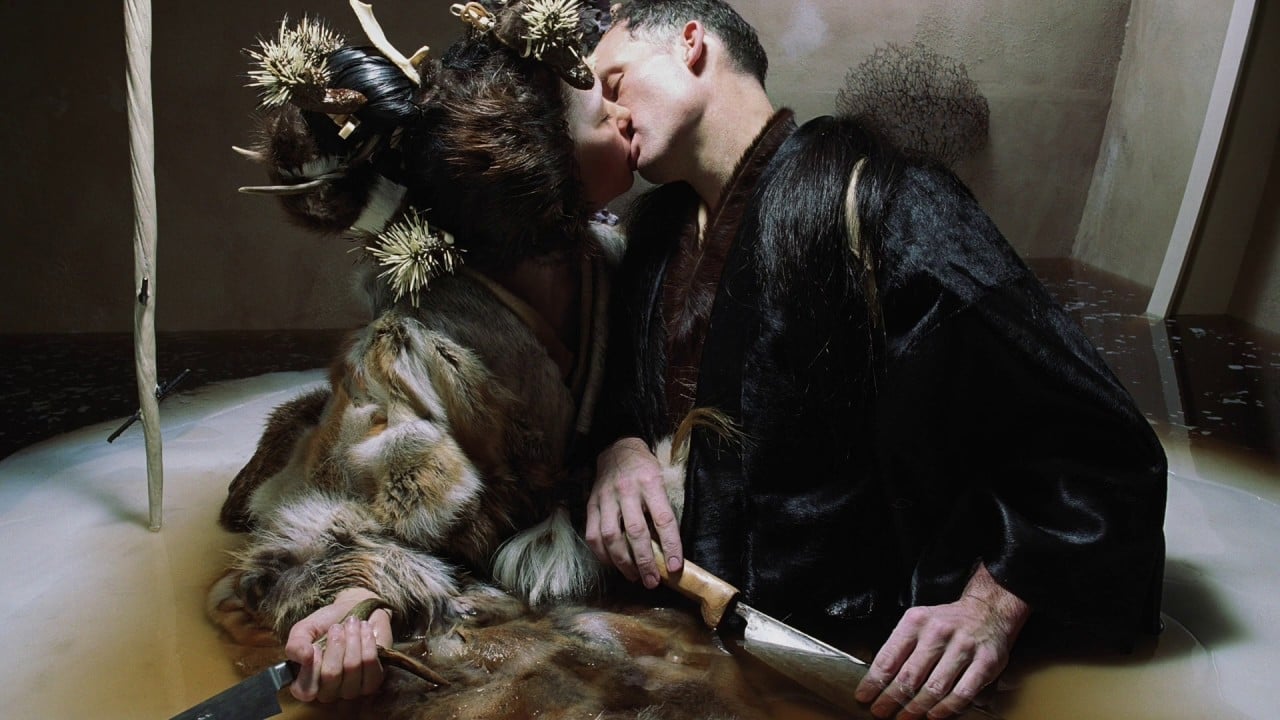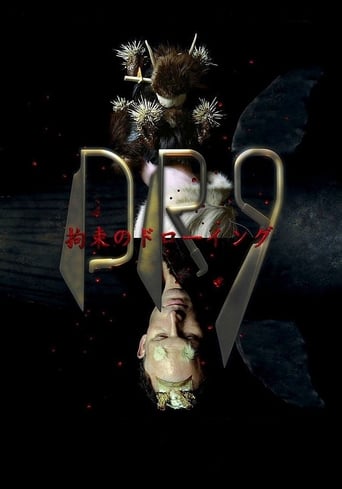Freaktana
A Major Disappointment
Comwayon
A Disappointing Continuation
Aedonerre
I gave this film a 9 out of 10, because it was exactly what I expected it to be.
Skyler
Great movie. Not sure what people expected but I found it highly entertaining.
sandover
This film is, mutatis mutandis, the Moby-Dick of our era.Matthew Barney has an Ahab-like obsession with art; it is appropriately ironic that in his case there are some eco-religious overtones against whaling that never really threaten with propaganda the fierceness of the meditation, for a meditation it is, part of Matthew Barney's lifelong meditation on America; if this seems far-fetched, remember Cremaster's epic scale, remember in Cremaster the Chrysler building, remember how evocative and subtle is Mailer's use in Cremaster as, that other exemplary American, Houdini. At least for me, this reverberates suggestively as one of the most refined recent comments on American spirituality.Is Matthew Barney's quest an unholy war towards art with art's conceptual industry? Is this what the ambivalent title/wordplay "Drawing Restraint" is about? Everyone will give his own answer, but for this viewer the object drawn is strikingly equivalent to what in lacanian psychoanalysis is called object a, that is an Utopian, fantasmatic object which in one instance can function as cause, and in another as object of desire. For me, this specific status of the object in his works, along with making the artistic object resist symbolization, that is, having the status of trauma as defined in psychoanalysis, is what makes funny Mr Barney's inquiry fascinating, standing apart, and him a kind of prophet of the unknown.Thank you.
rui-franco
This has got to be one of the worst movies I've ever seen! There were people leaving the theatre, others were falling asleep (ok, it was a late night show)... This is a no-sense movie, one of those who can make you never want to see an out of mainstream picture again. I would love to watch the making-off of this movie as I am deeply interested on what goes on the minds of the authors of such garbage. Do they laugh when they create all this ridiculous stuff or do they actually think they're doing something interesting? I wonder... The soundtrack is awful apart from some instrumental stuff that reminds you of a previous Bjork album. Even if you're a fan of Bjork's music, stay home. It's the best thing to do. The little, tiny, pieces of nice music are no reason for you to go out and submit yourself to this torture. God!...
fred-711
Last night I went to the movies; saw Drawing Restraint 9, a new film by Matthew Barney and featuring Bjork. I don't go to a lot of movies, but when I left this one I was convinced that I had not gone to a movie at all, but participated in an ancient magical rite having nothing to so with modern movie making.While definitely not a Hollywood feature, it was nevertheless described in the usual hyperbole put out by the theatrical machine conglomerates: "Mesmerizing Viewing, Amazingly Beautiful, Startling Wit and Invention." Of course it was all of the above, but what I saw and experienced in the movie theater was something more than that; something else altogether, the telling without words and reconstruction of an ancient primeval theater that can only be entered by instinct and non-human intelligence.Most of the action takes place aboard ship. On board a Japanese whaling vessel two occidental guests (Barney and Bjork) are invited aboard to share in a formal tea ceremony with the captain. First they are dressed in elaborate wedding clothes inspired by Shinto marriage rites, because after the ceremony they will emerge themselves in a kiss that not only unites the two in a limited matrimony, but also reunites them with the greater sea.I'm not even sure if this was a movie; perhaps it was an actual documentary constructed around the performance of some long forgotten ancient religious ritual, being remembered just now with the help of modern awareness that media affords, like the telescope aided Galileo in redefining the heavens. Yet I do not think the hundreds of "extras" were privy to any of this.And I should make it clear that the extras weren't really extras at all -- they were the actual crew members who live aboard ship. What Barney and Bjork have done, in my estimation, was commandeered the ship and held the captain and crew hostage -- with their permission of course, while pretending to star in a movie -- and then initiated the ancient rites recently remembered by the Icelandic Bjork.But of course the millions of dollars that this all must have cost would've produced one hell of a Hollywood blockbuster! Yet for Bjork and Barney it is an extremely limited engagement that will disappear within a week of its showing. For them the rewards will have been recognized instantly, not in box office dollars but in a newer awareness that an old universe continually demands of its inhabitants.The soundtrack is made of songs, chants and primeval sounds dispersed throughout the movie, which on another level act as incantations spoken directly to Nature, to reverse the direction of Art, specifically the Art of the Whaling Ship. This is hinted at when Bjork and Barney go through an amazing transformation at the close of the film, transforming themselves into whales, complete with blowholes, and return to the sea from which we were all plucked in our infancy.Further indication that this "movie" is really a magical rite in which we are all invited to take part is the captain's short telling of the history of the ship, how it suffered a slight scar at sea (being rammed by another ship), a scar which is now etched on the memory of the crew. "But there is a much older story within the deeper scar." The captain and his occidental guests tell that story to us, through the traditional Japanese tea ceremony wherein they drink of a mixture infused from of the "magnificent ambergris that was once passed through the whale" and the subsequent marriage vows by which the guests cut away superfluous limbs and prepare themselves for their voyage back to the sea, where ceremony once again takes on the fluidity of life.There are additional insights from Bjork's sparsely sung sound track. Utilizing the essential sounds from the ocean and the life in, around, and aboard the ship, she whispers in places the ancient formula of creation: From the moment of commitment, Nature conspires to help us. It is the old Christian aphorism, "All things are provided when we first seek the Kingdom of Heaven." Or Hell, if you prefer.In truth I believe this movie was conceived as ritual, performed by devout and honest people who were not acting (only accentuating and theatricalizing their normal activities) but ultimately redirecting the energies of nature towards the ending of a cruel and unusual punishment still being practiced on one of the great and magnificent life forms that welcomed us aboard in the first place.Possibly tedious at some points, I thought it was equally wonderful that Bjork and Matthew and the Captain and crew had so much leisure to be able to tell the story, to act in this way, to live for weeks or months on the ship and its legacy. But then, I'm a full time artist who has no idea what time it is.What was happening on the screen was only a key meant to unlock what has always been happening within us, within the deeper scar from which we all are naturally and continually emerging our being.Warning: Don't go see this movie with an audience who expected to go see a movie. Buy the DVD instead and follow the instructions, safely inside the privacy of your own home.
janna-19
Some of the themes that emerged for me: Minimizing use of natural resources in order to maximize the full capacity of human intelligence.The role of ritual as a focuser of intent that enables utter, literal transformation.Profound understanding of other forms of life via literal experience of what they have lived (in this case, using that species' human interaction as an entry point for understanding).Civilized human society's penchant for consuming nature to benefit materially while suppressing our (well documented) ability to shift shape as a means of enriching our intelligence immeasurably.I noticed how my mind didn't even question the industrialized hierarchy presented in the film, the ritual of common human toil or even the pageantry that has traditionally accompanied industrial "progress." But I had to struggle with the ritual that became the vehicle of transformation for the two main characters.What seemed like an unnatural act turned out to be only the human part of what is encountered by the species our hero and heroine sought to be. Their yearning to BE and experience that species seemed very natural.

